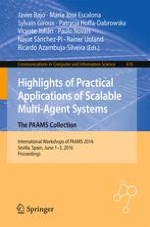2016 | OriginalPaper | Buchkapitel
Argumentation-Based Reasoning with Preferences
verfasst von : Kristijonas Čyras
Erschienen in: Highlights of Practical Applications of Scalable Multi-Agent Systems. The PAAMS Collection
Aktivieren Sie unsere intelligente Suche, um passende Fachinhalte oder Patente zu finden.
Wählen Sie Textabschnitte aus um mit Künstlicher Intelligenz passenden Patente zu finden. powered by
Markieren Sie Textabschnitte, um KI-gestützt weitere passende Inhalte zu finden. powered by
